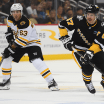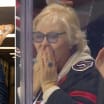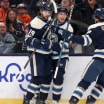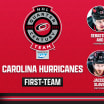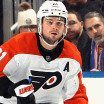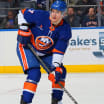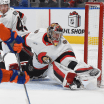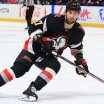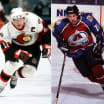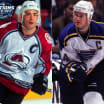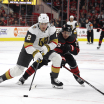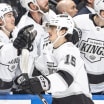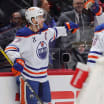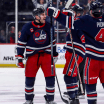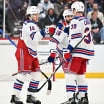Rutherford evaluating present, future of Canucks before Trade Deadline
President talks playoff chances, reconfigured front office in Q&A with NHL.com
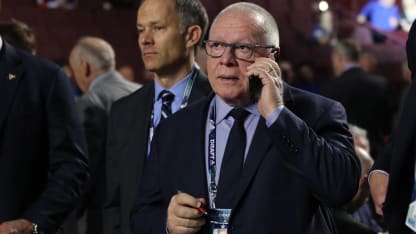
© Bruce Bennett/Getty Images
"This group of players worked hard to get back in the race," the Canucks president of hockey operations told NHL.com this week. "They deserve a lot of credit for showing a lot of character with what we're dealing with, a lot of key players having dealt with [COVID-19] and things like that. And so we want to see where this team goes."
The Canucks are 20-20-6 and enter the All-Star break 11 points behind the first-place Vegas Golden Knights in the Pacific Division. They are 12-5-4 since Bruce Boudreau replaced Travis Green as coach Dec. 5. Rutherford was hired four days later.
With seven weeks remaining until the 2022 NHL Trade Deadline on March 21, Rutherford said the roster is being closely monitored to determine if the Canucks will be sellers. There have been several reports that J.T. Miller could be moved. The forward leads Vancouver in goals (15) and points (44) in 44 games and is eligible to become an unrestricted free agent after next season.
"There are always lots of rumors out there and that's all they are, rumors," the 72-year-old said. "We have new voices in the front office. We have more people to evaluate the team and we'd like to stay in the race and become a playoff team.
"Now with that being said, we're like all other teams. You always have to project out in the future. And where are you going to be and what do you do? What do you do now? What do you do for the future? So I mean, that's pretty standard. But right now, it's important to focus on what we're doing here right now and win as many games as we can and see if we can catch up to the teams ahead of us."
Having helped reconfigure the Canucks front office, Rutherford took time in a wide-ranging interview to discuss some of the revolutionary management moves, his relationship with Boudreau and his vision for the team's future.
You made a couple of important, inclusive hires in your front office. You brought in Patrik Allvin, someone you worked with in your time with the Pittsburgh Penguins, as the first Sweden-born general manager in the NHL. And you opened the door for women by making player agent Emilie Castonguay the first woman assistant GM. What went into the thinking behind these hires?
"There are a lot of very good, qualified women around the League, and I talked to a handful. All are very capable of having high positions in the National Hockey League. I was very, very impressed. I feel really good about going through that process and Emily, she was very excited to take the position. We had several calls back and forth, trying to work through it to see if it worked for her and worked for us. She has such a good background to take this next step. She has her law degree. She's worked in sports management. She worked as an agent. She's done some entry-level contracts, so we're really excited about having her. We also added Rachel Doerrie to the analytics department. I'm very impressed by her also. I've just done some work with her over the last few days. So we're doing this for all the right reasons, not just to be trying something new. And in my time between Pittsburgh and Vancouver, I had time to think of if I got to manage a team again, how would I like to do it. And one of the things I wanted to do was put together a group to come up with a hockey system from different places and different ways so we can bring different ideas and different voices. Now that we've pretty much completed the group, that certainly is the case."
What about Patrik?
"It's taken a while for Europeans to be GMs in this league, hasn't it? Jarmo (Kekalainen) from Finland obviously is the first European GM and he's done a really good job (with the Columbus Blue Jackets). And in Patrik's case, he's very bright. He's a really good hockey guy and well connected in Europe. Him being a guy that I'm familiar with gave him a leg up. But with that being said, his interview was very good. He's a very impressive guy."
Normally the ideal structure is to have a team president and a GM in place before bringing in a new coach of their choosing. In this case, Boudreau was hired four days before you. Why do you feel you Bruce is the right man for the job even though he wasn't your hire?
"Well, not to anybody's surprise, he's a guy that's had an extremely good coaching career. He has the second-best winning percentage as a coach in his career (.635) behind Scotty Bowman (.657). He's a player's coach. He's a motivator. He was a good choice for where Vancouver was at, at this point in the season. And he's connected with the players and done a terrific job."
You and Bruce have past history, don't you?
"We go way back to our early 20s when we worked at the Bobby Orr-Mike Walton sports camp together north of Toronto in Orillia, Ontario. We hung out together there. We've known each other for a long time. Over the years we've always said it would be nice to work together. We joke that we were running out of time, but we finally got there."
You've been on the job for almost two months. Is there anything that has surprised you, either positively or negatively, in that time?
"There's a lot of things. I mean, I already liked the market. I knew the passion of the fans of Vancouver and it's a wonderful city. But I'm impressed with the people they have in place. I was impressed with owner Francesco Aquilini about how he really cared about the Canucks trying to do the right things to get them to be a contending team. The same goes for (president, Canucks Sports and Entertainment, business operations) Michael Doyle, who runs the whole company. He was a goalie at one time, he has a background in hockey and in business and a great resume. And so these people that I'm going to be working with, I felt very comfortable with, so I like that. As for the team, I followed Vancouver a lot because even if I'm not working, I watch all the games through to one o'clock in the morning. As a team, I watched a lot, and I was surprised that they weren't doing better in the first part of the season. But when I got here, Bruce had been here two games and they had won two games. They have just gotten better and better as a team. I think if we stick with it here, we can even build on what we've already done. So there's work to be done here."
Does building on something equate to being busy on the trade market? You mentioned earlier evaluations are being done on a daily basis, but you've never been shy to pull the trigger on trades. During your tenure as GM of the Penguins from 2014-21 you held on to just one of your first-round draft picks. You've stated you likely won't be moving high picks with the Canucks, but do you expect to be busy?
"We're going to work like all other teams. With all the new people in place here, we're going to do our normal business where we're trying to get back into a playoff spot. With Patrik on board now, he's fielding calls and listening to ideas that other teams have if it makes sense for all the things that you have to do when you're running a hockey team. That ranges from making your team better now and helping it in the future. Obviously, (NHL) salary cap considerations play a role."
Finally, even with the uncertainty facing your roster in the next seven weeks, are you encouraged about having a seemingly solid foundation of Thatcher Demko in goal, Quinn Hughes on defense and Elias Pettersson up front?
"I am but I'll say the obvious: We have some work to do to become better and become a contender. But there are a lot of good players here, some that got off to a slow start, some that didn't. A few of the players missed camp for various reasons, and when you miss training camp, it's hard to catch up. There are some real character players here and you've seen it as we've kind of battled through what we've been battling through the last few weeks. I give our players a lot of credit for coming into work and giving it everything they have in practice and everything they have in the games. And we can't ask for anything more than that."

